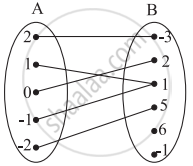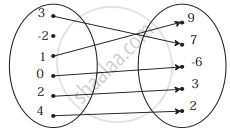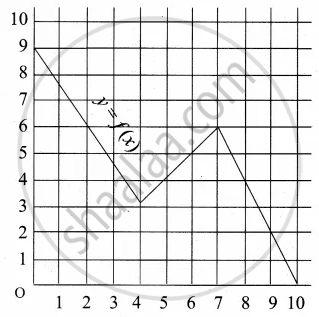Advertisements
Advertisements
प्रश्न
Check if the following relation is a function.

उत्तर
It is a function because every element of set A is related to one and only one element of the set B.
APPEARS IN
संबंधित प्रश्न
A function f : R → R is defined by f(x) = x2. Determine (a) range of f, (b) {x : f(x) = 4}, (c) [y: f(y) = −1].
Let X = {1, 2, 3, 4} and Y = {1, 5, 9, 11, 15, 16}
Determine which of the set are functions from X to Y.
(c) f3 = {(1, 5), (2, 9), (3, 1), (4, 5), (2, 11)}
The function f is defined by \[f\left( x \right) = \begin{cases}x^2 , & 0 \leq x \leq 3 \\ 3x, & 3 \leq x \leq 10\end{cases}\]
The relation g is defined by \[g\left( x \right) = \begin{cases}x^2 , & 0 \leq x \leq 2 \\ 3x, & 2 \leq x \leq 10\end{cases}\]
Show that f is a function and g is not a function.
If f(x) = x2 − 3x + 4, then find the values of x satisfying the equation f(x) = f(2x + 1).
If f(x) = loge (1 − x) and g(x) = [x], then determine function:
(iii) \[\frac{f}{g}\]
Write the range of the real function f(x) = |x|.
If f is a real function satisfying \[f\left( x + \frac{1}{x} \right) = x^2 + \frac{1}{x^2}\]
for all x ∈ R − {0}, then write the expression for f(x).
Write the domain and range of function f(x) given by
Which one of the following is not a function?
If \[f\left( x \right) = \log \left( \frac{1 + x}{1 - x} \right) \text{ and} g\left( x \right) = \frac{3x + x^3}{1 + 3 x^2}\] , then f(g(x)) is equal to
If \[f\left( x \right) = 64 x^3 + \frac{1}{x^3}\] and α, β are the roots of \[4x + \frac{1}{x} = 3\] . Then,
If \[3f\left( x \right) + 5f\left( \frac{1}{x} \right) = \frac{1}{x} - 3\] for all non-zero x, then f(x) =
The domain of definition of \[f\left( x \right) = \sqrt{\frac{x + 3}{\left( 2 - x \right) \left( x - 5 \right)}}\] is
The domain of definition of the function \[f\left( x \right) = \sqrt{x - 1} + \sqrt{3 - x}\] is
Let \[f\left( x \right) = \sqrt{x^2 + 1}\ ] . Then, which of the following is correct?
Check if the following relation is function:

If ƒ(m) = m2 − 3m + 1, find f(x + 1)
Which sets of ordered pairs represent functions from A = {1, 2, 3, 4} to B = {−1, 0, 1, 2, 3}? Justify.
{(1, 1), (2, 1), (3, 1), (4, 1)}
Find the domain and range of the follwoing function.
h(x) = `sqrt(x + 5)/(5 + x)`
Find the domain and range of the following function.
f(x) = `sqrt((x - 2)(5 - x)`
Let f be a subset of Z × Z defined by f = {(ab, a + b) : a, b ∈ Z}. Is f a function from Z to Z? Justify?
Check the injectivity and surjectivity of the following function.
f : R → R given by f(x) = x2
Express the following exponential equation in logarithmic form
10−2 = 0.01
Express the following exponential equation in logarithmic form
e2 = 7.3890
Express the following exponential equation in logarithmic form
`"e"^(1/2)` = 1.6487
Express the following exponential equation in logarithmic form
e–x = 6
Write the following expression as sum or difference of logarithm
In `[(root(3)(x - 2)(2x + 1)^4)/((x + 4)sqrt(2x + 4))]^2`
Write the following expression as a single logarithm.
`1/3 log (x - 1) + 1/2 log (x)`
Select the correct answer from given alternatives.
If log (5x – 9) – log (x + 3) = log 2 then x = ...............
Answer the following:
For any base show that log (1 + 2 + 3) = log 1 + log 2 + log 3
Answer the following:
Simplify, log (log x4) – log (log x)
A graph representing the function f(x) is given in it is clear that f(9) = 2

Describe the following Range
A function f is defined by f(x) = 3 – 2x. Find x such that f(x2) = (f(x))2
If the domain of function f(a) = a2 - 4a + 8 is (-∞, ∞), then the range of function is ______
Redefine the function f(x) = x − 2 + 2 + x , – 3 ≤ x ≤ 3
Let f(x) and g(x) be two real polynomials of degree 2 and 1 respectively. If f(g(x)) = 8x2 – 2x, and g(f(x)) = 4x2 + 6x + 1, then the value of f(2) + g(2) is ______.
